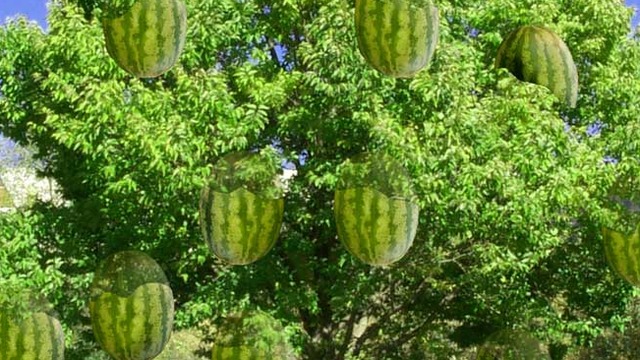Watermelon Doesn’t Grow on Trees
By Rabbi Jonathan Gewirtz, The Observant Jew
If you’re the type who reads a lot into the title of an article, you’re probably thinking, “Thank goodness watermelons don’t grow on trees! Someone could get hurt.” You’d be absolutely right, but I’m going somewhere else with this one.
I’d like to share a fantastic childhood memory with you. It isn’t mine, but it’s still so memorable that it’s worth retelling. A woman I know used to live in the Deep South. Her birthday is in July, and for her tenth or eleventh birthday, her parents arranged a watermelon eating contest for her whole class.
They were smart enough to do it outside, and when they were done, they just hosed off the driveway from all the pits and juice and watermelon pulp. She still remembers with glee how the next year their yard was full of watermelon plants!
As childhood memories go, I think that’s an amazing one. The magic of thinking that these watermelons (a special summertime treat for many people) sprouted and filled up her yard as an extension of her birthday celebration is enough to make even the most hardened of cynics smile in spite of themselves at the joy and optimistic jubilance of youth.
I don’t know the end of the story. Since watermelon plants can grow up to 20 feet long, they can wreak havoc on a yard. Perhaps her parents had to spend a lot of time pulling them out, or hiring a gardener to do it. She didn’t mention anything about having watermelon for lunch everyday so I’m assuming that they didn’t let the plants stay, and that being a child she didn’t remember that part since it was more mundane.
What I found especially magical about it, though, was how something so wonderful came along so unexpectedly. Here, they were simply trying to clean up a sticky mess, and they got a wonderful result that was more than they could have imagined.
Thinkers often speak about seeds. For example, one adage says, “Any fool can count the seeds in an apple, but only G-d can count the apples in a seed.” The potential in a seed, like the potential in people, is often overlooked. Not because it isn’t important, but because it is unfathomable. We can’t imagine the potential results, so we miss them.
Now, when a farmer plants a tree, he likely can guesstimate how many apples or oranges or avocadoes it might produce. Perhaps he knows how much a typical tree produces in a given time, and how the rainfall can affect it. He might not be surprised at the end result, but that’s because he’s looking at the dollars and cents of it. The tree is his livelihood and he has to have an expectation of what it will do. But watermelons don’t grow on trees. They are more unpredictable. Each seed may or may not produce. When you plant several at a time, you thin them out and choose the best one. Some of them will die and others will not be pollenated. It’s a toss-up and you won’t know until they grow.
Thinkers also speak of “scattering seeds.” The idea is that you put out kindness, holiness, and love into the world and those “seeds” will produce fruit you didn’t expect or couldn’t foresee, much as the woman’s watermelon plants.
Many of you have heard of John Chapman, better known by his nickname, “Johnny Appleseed.” He was famous for traveling through Ohio, Pennsylvania, Indiana, Ontario and nearby areas planting apple seeds. He is credited with enabling the large apple crops that area is blessed with. There are two facts about Johnny Appleseed that most of us don’t know but are rather important.
First of all, he was a very religious man. He had a strong faith in his god and he actually converted many Native Americans to Christianity. His devoutness is important because when putting effort into something whose outcome is not certain, you have to believe in what you’re doing. If you are trying to spread the message of how a servant of HaShem lives (and that’s a big part of our job as Jews) then you have to expect you’ll get pushback and disappointment. A strong faith will help you withstand the discouraging moments.
Second of all, John Chapman didn’t scatter seeds. He actually made nurseries, that is, small groups of viable plantings, usually surrounded by a fence to keep the animals away. When the trees in these nurseries grew, someone else would sell them to farmers for use in their orchards.
This is significant because it’s not enough to just throw some seeds here and there and hope they take root. If you want to see success, you have to be focused in what you do and put in the effort to get it started properly. Whether it’s an investment in a sapling or a sibling, a tree or a person, the more you put in at the beginning the better result you will see.
Watermelons don’t grow on trees, and in this case they got lucky that they took root. But life isn’t about luck. It’s about taking the time to sow the things you’d like to reap, and recognizing that the potential for growth is unmeasurable.
© 2018 – All Rights Reserved
Did you enjoy this column? Feedback is welcome and appreciated. E-mail info@JewishSpeechWriter.com to share your thoughts. You never know when you may be the lamp that enlightens someone else.






